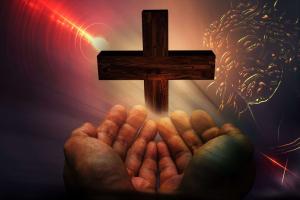
The kingdom of God is at hand, indeed, it is within us. This is because we are made in the image and likeness of God. Where God’s image is found, God’s presence can also be found, for God’s image cannot be found separated from God. And so, within us, at the core of our being, we find ourselves partaking of the divine nature itself, as Sergius Bulgakov understood: “Man’s capacity for participating in the divine is the divine image, which is the very foundation of his being.”[1]
We are called to partake of the divine nature, to participate in and experience the kingdom of God for ourselves. That is, we should open ourselves up to the bountiful grace of the kingdom of God, and when we do so, we will find out that such grace has always been there with us since we came to exist. What we must do is embrace the grace which we have already been given, to allow it to transform us from within, so that the image and likeness of God will not be something which lies hidden, but will be made clear to all those who encounter us, as we find ourselves becoming more and more like God ourselves. For we are meant to be like God. “In its ultimate glory and ultimate beauty and in the happiness promised it, the human soul will be similar to its creator.” [2] This is what theosis, or deification, is about, that is, the realization of our potential, the potential given to us in our very nature. It is important for us to realize that by being created this way, God shows us that we have always been intended to partake of and have a share in the divine life.
This means paradise is not something we should look for outside of ourselves; rather, it exists and is to be found in all of us. Our inner nature, our bosom, is truly paradise. St. Jerome hints at this when he explained, “I say this, that Abraham’s bosom is true Paradise, but I also grant that the bosom of a holy man is Paradise.”[3] The bosom, the true nature of anyone, is paradise, however, most of us have fallen away from our nature, most of us have defiled ourselves, covering up that nature by our sins, and in this way, find ourselves in exile. We were never intended to be in this state, we were always intended to find ourselves in paradise, and there, find ourselves growing in grace, becoming more and more like God, experiencing more and more of the glory of God for ourselves. While sin has made it so we do not experience this, sin does not have the last word. Jesus took our nature, made it a part of himself, and not only showed the world what it was intended to be, he provided the means by which we can find it restored in ourselves. He showed us the way back to paradise, to the kingdom of God which is within us all. We need to put all the defilement which covers up the image of God, all the sin, as it were, to the fire of divine love, so that being cleansed in this fashion, we will then experience the glory of paradise for ourselves, finding, of course, that the kingdom of God, paradise, was always there with us. The situation we find ourselves can be seen to be like that of a golden statue, covered in trash, and encased in mud, so that nothing of the nature of the statue can be discerned by those who pass it by: what they see appears to be worthless, and so they ignore it, but if someone were to pick it up, wash away all the mire, they would find the true nature of the statue, and see it for all its worth. This is what Christ helps us do with human nature, allowing us to see what it is like in its purity.
What exactly is the glory of the kingdom of God like? Until we experience it for ourselves, it is something beyond our imagination. Since it is already there within us, hopefully we have had some glimpses of it, however mirky, which will give us just enough inspiration to know that it is something worthy to pursue. However, without further experience of it, we cannot properly know what it is like, nor will we understand the experience others have of it if they should tell us about their experiences. It would be like trying to know what honey tastes like without actually eating it for ourselves. We might have some idea of what it tastes like due to other sweets we have eaten, but all the unique flavors that can be discerned in honey will not be known until we try it for ourselves.
We, of course, should hope to experience paradise, even if a little, in our temporal lives, to have a foretaste of the glory which is to come to us in eternity. And it should not be surprising that we should be able to do so, for just as a golden statue covered in mire will slowly reveal its nature when it is being washed, so we should slowly begin to experience the peace and joy of paradise the more we conform ourselves to our original, good nature, that is, to the image and likeness of God which is already within us. And as God is love, so our nature is itself an image and reflection of love; the more we love, the more we will burn away, as it were, all the defilements which cover up the good nature which exists within us. The love will grow greater and greater, burning brighter and brighter, until, in the end, all that remains will be love, and we will understand truly how and why God can be said to be love “Now, may He Who will gather all things unto Himself on the last day make the fire in your blaze brightly,”[4] so that truly we can experience the kingdom of heaven, paradise, not just in the eschaton, but now, realizing through it the beginning of our theosis, our eternal journey to become more and more like God.
[1] Sergius Bulgakov, Bride of the Lamb. Trans. Boris Jakim (Grand Rapids, MI: William B. Eerdmans Publishing Company, 2002), 300.
[2] William of Auvergne, The Trinity, Or The First Principles. Trans. Roland J. Teske, SJ and Francis C. Wade, SJ (Milwaukee: Marquette University Press, 1989), 172.
[3] St. Jerome, “Homily 86” in The Homilies of Saint Jerome: Volume Two. Trans. Sister Marie Liguori Ewald, I.H.M. (Washington, DC: CUA Press, 1965), 203.
[4] St. Hildegard of Bingen, “Letter 128” in The Letters of Hildegard of Bingen. Volume II. Trans. Joseph L Baird and Radd K Ehrman (Oxford: Oxford University Press, 1998), 72.
Stay in touch! Like A Little Bit of Nothing on Facebook.
If you liked what you read, please consider sharing it with your friends and family!












